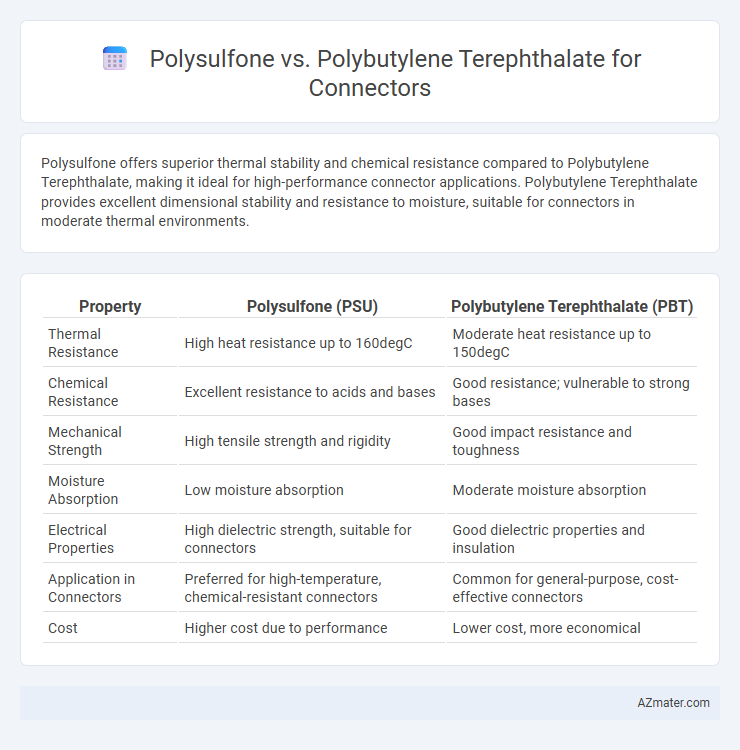Polysulfone offers superior thermal stability and chemical resistance compared to Polybutylene Terephthalate, making it ideal for high-performance connector applications. Polybutylene Terephthalate provides excellent dimensional stability and resistance to moisture, suitable for connectors in moderate thermal environments.
Table of Comparison
| Property | Polysulfone (PSU) | Polybutylene Terephthalate (PBT) |
|---|---|---|
| Thermal Resistance | High heat resistance up to 160degC | Moderate heat resistance up to 150degC |
| Chemical Resistance | Excellent resistance to acids and bases | Good resistance; vulnerable to strong bases |
| Mechanical Strength | High tensile strength and rigidity | Good impact resistance and toughness |
| Moisture Absorption | Low moisture absorption | Moderate moisture absorption |
| Electrical Properties | High dielectric strength, suitable for connectors | Good dielectric properties and insulation |
| Application in Connectors | Preferred for high-temperature, chemical-resistant connectors | Common for general-purpose, cost-effective connectors |
| Cost | Higher cost due to performance | Lower cost, more economical |
Introduction to Polysulfone and Polybutylene Terephthalate
Polysulfone (PSU) is a high-performance thermoplastic known for its excellent thermal stability, chemical resistance, and mechanical strength, making it suitable for connectors in demanding environments. Polybutylene Terephthalate (PBT) is a semi-crystalline thermoplastic polyester recognized for its good electrical properties, dimensional stability, and resistance to moisture and chemicals, commonly used in electrical connectors. The choice between polysulfone and polybutylene terephthalate depends on specific requirements such as temperature resistance, mechanical stress, and environmental exposure in connector applications.
Key Properties of Polysulfone for Connectors
Polysulfone exhibits exceptional thermal stability, maintaining mechanical strength and dimensional integrity at temperatures up to 150degC, making it ideal for high-performance connectors. Its superior chemical resistance against acids, bases, and hydrocarbons ensures durability in harsh environments. Additionally, polysulfone offers excellent electrical insulation properties and high impact resistance, crucial for reliable connector performance in demanding applications.
Distinctive Characteristics of Polybutylene Terephthalate
Polybutylene Terephthalate (PBT) offers exceptional chemical resistance, high dimensional stability, and excellent electrical insulation, making it ideal for connectors used in harsh environments. Its superior resistance to hydrolysis and thermal degradation provides longer service life compared to Polysulfone under exposure to moisture and elevated temperatures. Additionally, PBT exhibits enhanced mechanical strength and low moisture absorption, ensuring consistent performance in automotive and electronic connector applications.
Mechanical Strength: Polysulfone vs Polybutylene Terephthalate
Polysulfone exhibits superior mechanical strength compared to Polybutylene Terephthalate (PBT), offering higher tensile and impact resistance essential for connectors subjected to mechanical stresses. The glass transition temperature of Polysulfone around 185degC contributes to its dimensional stability and maintains structural integrity under high thermal and mechanical loads. In contrast, PBT has lower tensile strength and impact resistance, making Polysulfone the preferred choice for connectors requiring enhanced durability and mechanical performance.
Thermal Stability Comparison
Polysulfone exhibits superior thermal stability compared to Polybutylene Terephthalate, maintaining performance at continuous use temperatures up to 150degC, whereas Polybutylene Terephthalate typically withstands temperatures only up to 120degC. The high glass transition temperature (Tg) of Polysulfone, around 185degC, enables enhanced resistance to heat deformation and thermal aging, critical for connector applications exposed to elevated temperatures. Polybutylene Terephthalate's lower melting point and Tg result in reduced thermal resistance, making Polysulfone the preferred choice for connectors requiring long-term durability under thermal stress.
Chemical Resistance in Connector Applications
Polysulfone (PSU) exhibits superior chemical resistance compared to Polybutylene Terephthalate (PBT), particularly against acids, alkalis, and hot water, making it ideal for connectors in harsh chemical environments. PBT offers good resistance to fuels and oils but tends to degrade when exposed to strong solvents and high-temperature chemical exposure. In connector applications requiring durability against aggressive chemicals and thermal stability, polysulfone ensures longer service life and reliable performance.
Electrical Insulation Performance
Polysulfone exhibits superior electrical insulation performance compared to Polybutylene Terephthalate (PBT) due to its high dielectric strength and low moisture absorption, ensuring stable insulation in harsh environments. PBT offers good electrical properties but may degrade under prolonged exposure to heat and humidity, impacting its insulation reliability. Selecting polysulfone for connectors enhances long-term insulating durability and maintains performance in demanding electrical applications.
Processing and Manufacturability
Polysulfone offers excellent thermal stability and chemical resistance, making it suitable for high-performance connectors requiring precise injection molding and thermal tolerance during processing. Polybutylene Terephthalate (PBT) provides superior dimensional stability and faster crystallization rates, resulting in shorter cycle times and easier manufacturability for mass production of connectors. PBT's lower processing temperatures compared to Polysulfone reduce equipment wear and energy consumption, optimizing production efficiency in connector fabrication.
Cost Considerations for Industrial Connectors
Polysulfone offers high thermal stability and chemical resistance but typically comes at a higher material cost compared to Polybutylene Terephthalate (PBT). PBT provides a cost-effective solution with good mechanical strength and electrical insulation properties, making it favorable for large-scale industrial connector applications. Evaluating total lifecycle costs, including processing, durability, and replacement frequency, is essential when selecting between polysulfone and PBT for industrial connectors.
Application Suitability: Which Material to Choose?
Polysulfone offers excellent thermal stability, chemical resistance, and flame retardancy, making it ideal for connectors used in harsh environments such as medical devices and aerospace applications. Polybutylene Terephthalate (PBT) provides superior dimensional stability, electrical insulation, and moisture resistance, suitable for automotive and consumer electronics connectors. Choosing between polysulfone and PBT depends on the specific operational conditions, where polysulfone excels in high-temperature, chemically aggressive settings, while PBT is preferred for general-purpose, cost-effective applications with moderate thermal and mechanical demands.

Infographic: Polysulfone vs Polybutylene Terephthalate for Connector
 azmater.com
azmater.com